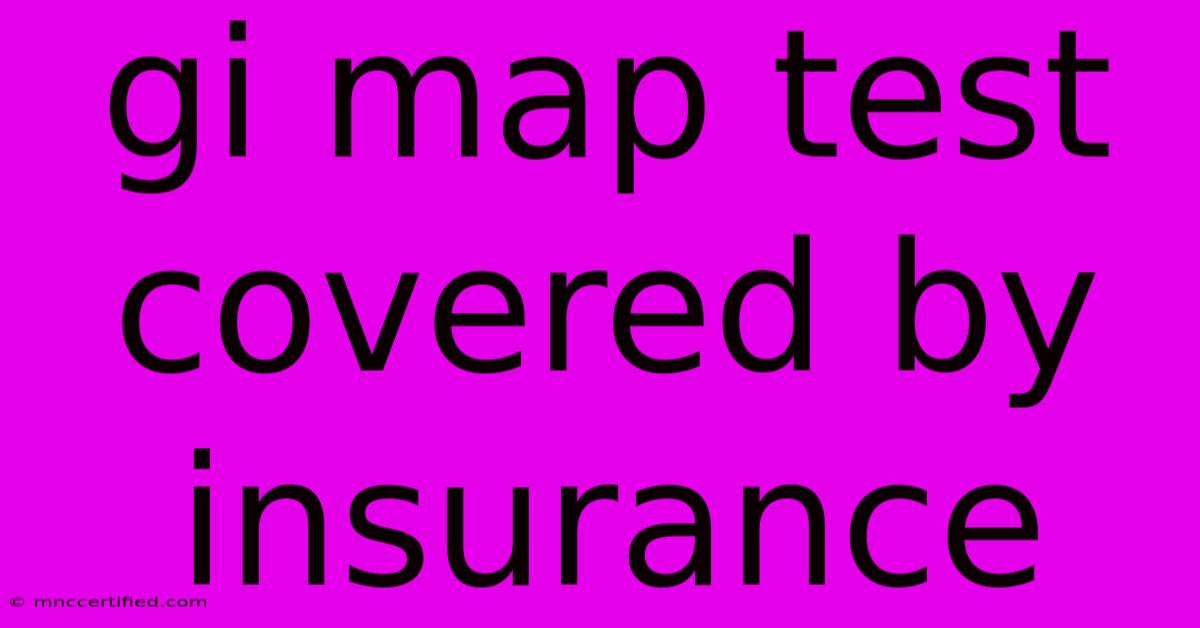Gi Map Test Covered By Insurance

Table of Contents
GI Map Test Covered by Insurance: A Comprehensive Guide
Getting a comprehensive understanding of your gut health is crucial for overall wellness. The GI Map test offers detailed insights into your gut microbiome, identifying potential imbalances and informing personalized treatment plans. However, a key consideration for many is whether insurance covers this advanced diagnostic tool. This guide explores the complexities of GI Map test insurance coverage, helping you navigate the process and maximize your chances of approval.
Understanding the GI Map Test
Before diving into insurance coverage, let's clarify what the GI Map test entails. This advanced stool analysis goes beyond basic stool tests, providing a far more detailed picture of your gut's microbial ecosystem. It identifies:
- Bacteria: Pinpointing both beneficial and harmful bacterial species and their relative abundance.
- Parasites: Detecting the presence of parasitic infections, often overlooked in standard tests.
- Yeasts and Fungi: Assessing the levels of Candida and other fungi, which can contribute to gut dysbiosis.
- Viruses: Identifying potential viral infections affecting the gut.
- Immune Markers: Measuring inflammatory markers that reveal the gut's immune response.
This comprehensive profile enables healthcare providers to diagnose various gastrointestinal conditions, including irritable bowel syndrome (IBS), Crohn's disease, ulcerative colitis, and small intestinal bacterial overgrowth (SIBO).
Insurance Coverage: The Variables
Unfortunately, there's no simple yes or no answer to whether your insurance covers the GI Map test. Coverage depends on several factors:
1. Your Insurance Plan:
- Type of Plan: PPO plans generally offer broader coverage than HMOs or EPOs. The specific details of your benefits package are crucial.
- Coverage Details: Carefully review your policy's "laboratory testing" or "diagnostic testing" section. Look for specific codes related to comprehensive stool analysis. You may need to contact your insurance provider directly for clarification.
- Network Providers: The GI Map test must be ordered by a provider within your insurance network to maximize your chances of coverage. Out-of-network testing is less likely to be reimbursed.
2. Medical Necessity:
This is a critical aspect. Insurance companies typically require a clear medical justification for the test. Your doctor must demonstrate that the GI Map test is medically necessary to diagnose or manage a specific condition. A simple request for a "gut health checkup" is unlikely to result in approval.
Pro-Tip: Prepare detailed documentation outlining your symptoms, previous treatments, and why your doctor believes the GI Map test is necessary for accurate diagnosis and treatment planning. This strengthens your case for coverage.
3. Pre-Authorization:
Many insurance plans require pre-authorization for advanced diagnostic tests like the GI Map. This involves submitting a request to your insurance company before the test is performed. Failure to obtain pre-authorization can lead to significant out-of-pocket expenses.
Strategies to Maximize Your Chances of Coverage
- Doctor's Recommendation: A strong recommendation from your gastroenterologist, clearly outlining the medical necessity of the test, is paramount.
- Detailed Explanation of Symptoms: Provide your doctor with a thorough history of your gastrointestinal symptoms, including their duration, severity, and impact on your quality of life.
- Alternative Tests: Discuss alternative diagnostic tests with your doctor. If less expensive options have been ruled out, it strengthens the argument for the GI Map.
- Appeal Process: If your initial claim is denied, don't give up. Understand the reasons for denial and carefully follow the insurance company's appeals process. Provide additional supporting documentation as needed.
Exploring Alternatives and Cost Considerations
If insurance coverage is denied, consider these options:
- Health Savings Account (HSA): If you have an HSA, you can use pre-tax funds to cover the cost.
- Flexible Spending Account (FSA): Similar to an HSA, an FSA can help offset the expenses.
- Payment Plans: Many labs offering the GI Map test offer payment plans to make the test more accessible.
Conclusion
While insurance coverage for the GI Map test is not guaranteed, proactive steps and thorough preparation can significantly improve your chances. Open communication with your doctor and insurance provider is key to navigating this process successfully and accessing the valuable insights this advanced test offers. Remember to always review your policy details thoroughly and seek clarification from your insurer when needed. By understanding the intricacies of insurance coverage and employing the strategies outlined here, you can increase your likelihood of having this beneficial test covered.

Thank you for visiting our website wich cover about Gi Map Test Covered By Insurance. We hope the information provided has been useful to you. Feel free to contact us if you have any questions or need further assistance. See you next time and dont miss to bookmark.
Featured Posts
-
Bond Arms Holster Texas Defender
Nov 21, 2024
-
Megan Moroney Cma Award Reaction
Nov 21, 2024
-
Best Dental Insurance New Mexico
Nov 21, 2024
-
Everett Cash Mutual Insurance Pa
Nov 21, 2024
-
Gingivectomy Cost With Insurance
Nov 21, 2024